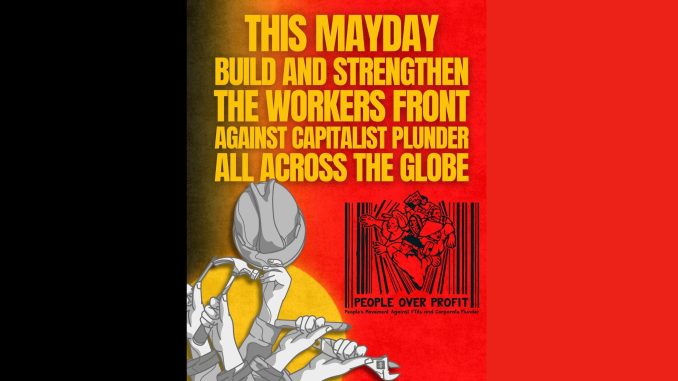
In this International Labor Day, we celebrate the struggles and achievements of workers all over the world. This historical day serves as a reminder that whatever benefits workers enjoy today came not from the benevolence of capitalists, but from the persistent and militant struggle of workers throughout their existence. It is only because of the latter that workers now generally enjoy some rights such as an end to child labor, the eight-hour workday, maternity leave, and relatively fair minimum wage.
However, as we know, these rights are not only insufficient, they remain a distant reality for the vast majority of workers. Worse still, they are constantly attacked and eroded in the midst of a worsening global economic crisis driven by a system that prioritizes profit-making over the well-being of those who make the world – the workers. This erosion of the rights that workers have won through prolonged and bloody struggle – and thus the intensifying exploitation of workers under the economic crisis – are most severe in the Global South.
With the recent tariffs imposed by President Trump igniting a retaliatory trade war, the global economy is plunging into deeper crisis. As inflation rates – already intolerably high – continue to skyrocket, wages remain stagnant. Workers across the globe are being crushed under the weight of collapsing purchasing power and are pushed further into dire poverty.
Mass layoffs are endemic, leaving workers and their families without income overnight. Precarious employment has become the norm, trapping workers in unstable, low-paying jobs with no security. Meanwhile, the aggressive spread of contractualization reduces them to temporary, disposable labor, stripping away the dignity and rights of stable, long-term employment. Hard-won benefits are being slashed or erased altogether. And as unsafe working conditions persist, with Occupational Health and Safety standards routinely ignored and violated, workers are being killed on the job with no accountability in sight.
This crisis hits women workers especially hard, as hard-fought rights like equal pay and maternity leave are being rolled back, all while they remain concentrated in heavily contractualized sectors like manufacturing and services, where exploitation is rampant. At the same time, more and more young workers are unable to secure decent work, fueling a surge in youth unemployment both in the cities and the countryside, and leaving new generations trapped in precarity.
While workers all across the globe struggle to make ends meet, the capitalists who profit from their labor grow ever richer. Across industries and across borders, elites expand their power off the backs of the working majority. They race to outdo one another in the pursuit of greater profit and in the expansion of their empires, competing not only in markets, but also in how ruthlessly they can exploit workers. Instability and collapse are thus built in the system; the crisis we are facing today is not a temporary downturn, but a symptom of an economy designed to serve profit over people.
Workers who organize as a means to improve their conditions are met with threats of termination, intimidated into leaving their unions, and harassed by state and private forces – some even armed. These attacks are designed to break worker solidarity, suppress collective action, and maintain poverty wages by keeping workers stripped of their rights.
Yet despite harsh repression, workers continue to resist. Strikes and protests are erupting daily across every region of the world and are an inevitable response to the deepening instability of the system itself. And these actions are far from futile – they win real gains that improve the lives of workers. The victories of the Nexperia workers in the Philippines as well as the palm oil and nickel mine workers in Indonesia stand as powerful examples of what organized struggle can achieve.
More importantly, the solidarity extended by other sectors of society in these struggles proves that the economic crisis spares no one – its impacts are felt across different sectors and different classes. In the face of this intensifying exploitation, we must build and strengthen a workers-led united front against capitalist plunder – one that acts not only in days like today, but everyday. Workers must continue to rise in struggle, shoulder to shoulder with students, peasants, urban poor, and all oppressed sectors and classes, forging a powerful common front to collectively demand: People over profit!
